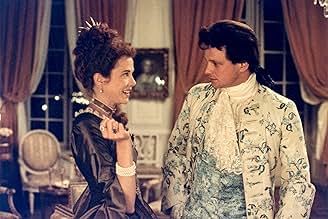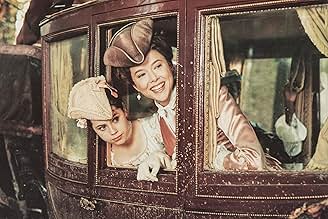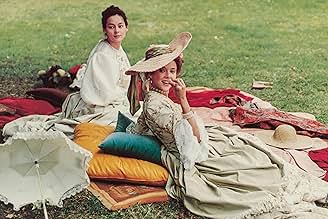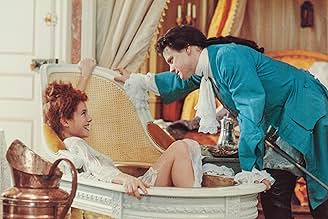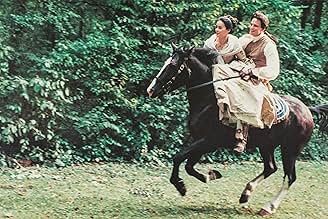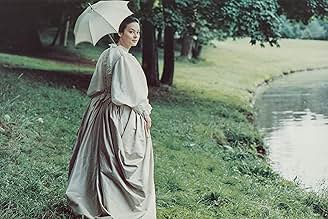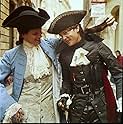IMDb रेटिंग
7.0/10
15 हज़ार
आपकी रेटिंग
अपनी भाषा में प्लॉट जोड़ेंFrance before 1789: When a widow hears that her lover is to marry her cousin's daughter, she asks the playboy Valmont to take the girl's virginity. But first she bets him, with her body as p... सभी पढ़ेंFrance before 1789: When a widow hears that her lover is to marry her cousin's daughter, she asks the playboy Valmont to take the girl's virginity. But first she bets him, with her body as prize, to seduce a virtuous, young, married woman.France before 1789: When a widow hears that her lover is to marry her cousin's daughter, she asks the playboy Valmont to take the girl's virginity. But first she bets him, with her body as prize, to seduce a virtuous, young, married woman.
- निर्देशक
- लेखक
- स्टार
- 1 ऑस्कर के लिए नामांकित
- 3 जीत और कुल 5 नामांकन
Siân Phillips
- Madame de Volanges
- (as Sian Phillips)
Sébastien Floche
- Priest
- (as Sebastien Floche)
फ़ीचर्ड समीक्षाएं
Milos Forman's version of 'Dangerous Liasons' was relegated to the second tier at the time of its release, which occurred close on the heels of Stephen Frears' version starring Glenn Close and John Malkovitch. I saw them both in the theatre when they were released and from the start enjoyed Forman's film far more than Frears'.
Annette Beining is a wonderful Madame de Mertueil, beautiful, intelligent, ruthless and in the end tragic. Glenn Close is pretty two-dimensional by comparison for Frears. And Colin Firth is more the laughing cavalier, with a heart, than was John Malkovitch for Frears, who mostly grimaces smugly and is highly distasteful and ego-centric. I liked Firth's sense of humor about himself, it makes the ending more poignant.
On paper some of the casting of Forman's version seems questionable, but all, except one, work very well. Most surprising was Henry Thomas's young lover. Thomas can be a dull actor but his reticent performance is apt for the gauche young man learning the ropes of 18th century Parisian society. Fairuza Bulk is delightful and funny as the virginal Céline. The supporting cast, notably Fabia Drake's dotty old Madame de Rosemond, are excellent. Siân Philips and Jeffrey Jones provide some very funny moments, though their characters are anything but "funny".
Only Meg Tilly falls short. Her American accent and modern delivery of the lines is disappointing. But she is a good actress and manages to convince in the end, though a more "Frenchified" performer would have served the story more effectively.
The music, cinematography and choreography are superb. The settings are very beautiful.
Forman's 'Valmont' deserves to be reconsidered by those critics who found it lacking when it first appeared.
Annette Beining is a wonderful Madame de Mertueil, beautiful, intelligent, ruthless and in the end tragic. Glenn Close is pretty two-dimensional by comparison for Frears. And Colin Firth is more the laughing cavalier, with a heart, than was John Malkovitch for Frears, who mostly grimaces smugly and is highly distasteful and ego-centric. I liked Firth's sense of humor about himself, it makes the ending more poignant.
On paper some of the casting of Forman's version seems questionable, but all, except one, work very well. Most surprising was Henry Thomas's young lover. Thomas can be a dull actor but his reticent performance is apt for the gauche young man learning the ropes of 18th century Parisian society. Fairuza Bulk is delightful and funny as the virginal Céline. The supporting cast, notably Fabia Drake's dotty old Madame de Rosemond, are excellent. Siân Philips and Jeffrey Jones provide some very funny moments, though their characters are anything but "funny".
Only Meg Tilly falls short. Her American accent and modern delivery of the lines is disappointing. But she is a good actress and manages to convince in the end, though a more "Frenchified" performer would have served the story more effectively.
The music, cinematography and choreography are superb. The settings are very beautiful.
Forman's 'Valmont' deserves to be reconsidered by those critics who found it lacking when it first appeared.
Annette Bening has proved again what a versatile actress she is. She positively emanates cruelty and perverseness in this film, but she is the epitome of sweetness in "American President" and fragility in "American Beauty." The pleasure her character takes in causing others' pain makes one easily imagine her reincarnated as a Gestapo torturer. Colin Firth is, as usual, handsome, charming, and believable. Fairuza Balk completely captures the confusion, excitement, and naiveté one would expect of a girl reentering the world after years in a convent. Meg Tilly shows a depth that I hadn't expected and Fabia Drake is wonderful as the hard-of-hearing, elderly, but wise, matron. The costumes and sets were exquisite and evoked the period completely. I highly recommend this for the performances and the ambiance.
Cecile (Fairuza Balk) is a 15 year old who has been living in a convent for 6 years. She's happy that her mother Madame de Volanges (Siân Phillips) has arranged a marriage for her to Gercourt (Jeffrey Jones). Volanges trusts her cousin Marquise de Merteuil (Annette Bening) to guide Cecile but she doesn't know that Gercourt discarded Merteuil as his lover. For revenge, Merteuil intends to spoil Cecile's virginity and thereby her pending marriage to Gercourt. She asks her former lover, the Vicomte de Valmont (Colin Firth), to do the seducing but he refuses. He is more interested in bedding the married Madame de Tourvel (Meg Tilly). Merteuil makes an indecent bet with Valmont. Meanwhile Cecile falls for her music teacher Danceny (Henry Thomas).
Director Milo Forman brings a lascivious feeling to the material. The romance is drained out of this which is replaced with something darker. Fairuza Balk is shockingly young which only adds to its forbidden realism. Whereas the great Dangerous Liaisons feels luscious and beautiful, this version feels dirtier and uglier. Annette Bening is wonderful. This is an interesting second look at the same story.
Director Milo Forman brings a lascivious feeling to the material. The romance is drained out of this which is replaced with something darker. Fairuza Balk is shockingly young which only adds to its forbidden realism. Whereas the great Dangerous Liaisons feels luscious and beautiful, this version feels dirtier and uglier. Annette Bening is wonderful. This is an interesting second look at the same story.
'Valmont' was overshadowed by the popularity of 'Dangerous Liaisons' which released just about a year before. Both movies were based on the same novel. It has been too long since I last watched 'Dangerous Liaisons'. I remember the ending being slightly different and the acting a little more dramatic.
'Valmont' solidly makes its own stand. Milos Forman gives it a slightly larger than life look with the colourful lavish sets and exquisite costumes but he balances it wonderfully with the actors' subtle performances, a beautiful soundtrack and stunning cinematography.
Forman tells the story very well. Even though I had a vague idea of what it was about, I liked Forman's presentation and he still managed to surprise me a few times. 'Valmont' brings forth some strong themes, such as that of love, seduction, lust, sexuality, marriage, chastity, monogamy and envy. All themes are brilliantly incorporated into the story and characters. Additionally , the viewer delightfully benefits from some splendid lines, especially the dialogue delivered between Annette Bening and Colin Firth. Their sequences along with the one where a soaking wet Meg Tilly asks Valmont to love her and a dance number where Valmont dances with four women are some of the most memorable movie moments.
Needless to say, each and every one of the performances are first rate. I couldn't picture anyone else other than Colin Firth in Valmont's shoes. He plays the part naturally, fitting it like a comfortable glove. Annette Bening is delightful as the playfully wicked baroness. Meg Tilly is wonderful as Tourvel. Fairuza Balk is a great choice as she possesses the innocence, naivety and youthfulness of Cecile.
Valmont is definitely not your average costume drama. While it tells an engaging story on human relationships, it raises some interesting questions on the aforementioned themes, questions that hold strongly relevant for today's world too. It's a stunning cinematic piece.
'Valmont' solidly makes its own stand. Milos Forman gives it a slightly larger than life look with the colourful lavish sets and exquisite costumes but he balances it wonderfully with the actors' subtle performances, a beautiful soundtrack and stunning cinematography.
Forman tells the story very well. Even though I had a vague idea of what it was about, I liked Forman's presentation and he still managed to surprise me a few times. 'Valmont' brings forth some strong themes, such as that of love, seduction, lust, sexuality, marriage, chastity, monogamy and envy. All themes are brilliantly incorporated into the story and characters. Additionally , the viewer delightfully benefits from some splendid lines, especially the dialogue delivered between Annette Bening and Colin Firth. Their sequences along with the one where a soaking wet Meg Tilly asks Valmont to love her and a dance number where Valmont dances with four women are some of the most memorable movie moments.
Needless to say, each and every one of the performances are first rate. I couldn't picture anyone else other than Colin Firth in Valmont's shoes. He plays the part naturally, fitting it like a comfortable glove. Annette Bening is delightful as the playfully wicked baroness. Meg Tilly is wonderful as Tourvel. Fairuza Balk is a great choice as she possesses the innocence, naivety and youthfulness of Cecile.
Valmont is definitely not your average costume drama. While it tells an engaging story on human relationships, it raises some interesting questions on the aforementioned themes, questions that hold strongly relevant for today's world too. It's a stunning cinematic piece.
I liked this better than Dangerous Liaisons which came out at about the same time. Of course Dangerous Liaisons was very good, and John Malkovich, who played Vicomte de Valmont, is an actor of power, and Glenn Close, who played the Marquise de Merteuil, is highly accomplished, but I preferred the charm of Colin Firth in this film to the brutality of Malkovich, and I thought Annette Bening was just delightful. She played Merteuil with exquisite timing and an ironic witchery and warmth that I shall not soon forget. I preferred her playful, sly wit to Close's cool cynicism.
The story comes from a novel by Choderlos de Laclos set in 18th century France that was made into a stage play by Christopher Hampton. It is a cynical satire on human sexuality as well as a very subtle examination of sexual hypocrisy and desire, a kind of oh so sophisticated laugh at bourgeois morality that would have delighted Voltaire and Moliere and greatly amused Shakespeare. It is a tale of elaborate lechery and revenge that backfires because it seems that anybody, even the most jagged rake can fall in love, and thereby become the victim. The central assumption here is the same as that of the Cavalier poets, namely that marriage kills love. As Merteuil says, "You don't marry your lover."
Meg Tilly played Madame de Tourvel with subtlety and a riveting passion. One of the great sequences in the movie occurs after she has fallen madly in love with Valmont against her will. She stands outside his doorway in the rain for hours looking adoringly and forlornly up at his window. And then she is allowed to enter and receive a cool reception. Valmont says, "Do you want me to lie to you?" and she replies desperately, "Yes," and then it is her passion that overwhelms him, leading to a beautifully ironic twist. Shortly afterward he sees Merteuil, who has become more like a sister than an ex-lover, and says, "I feel awful." She replies, "Are you surprised? (Pause) You are an awful man." Hanging his head he continues, "Do you think a man can change?" "Yes. (Pause) For the worse."
This theme, that it is the beloved who has the power and that once you fall in love you lose all power, is repeated several times in the movie. Valmont pursues women, the harder to get the better, with a relentless and maniacal passion, but once he has them, he immediately loses interest. His making love absentmindedly to Cecile de Volanges (played with wide-eyed innocence and girlish charm by Fairuza Balk) was an incredible irony when we consider what she would cost Gercourt, played with his rather substantial nose in the air by Jeffrey Jones, whom you may recall as the pratfalling principal in Ferris Bueller's Day Off (1986).
There is some insidious philosophy here, some sardonic observations on human nature worth mentioning. One is that the man beloved of women gets most of the reproductive tries, and regardless of his rakishness, is still beloved. Another is that duplicity is the accepted, even required, standard of behavior in society, and that when it comes to sex, one must, perforce, always lie.
Milos Forman's direction was invisible and therefore a work of art. The incidental scenes and backdrops depicting the color, squalor and decadence of pre-revolutionary France added just the right amount of atmosphere. The costumes were stunning and much cleaner than they would have been in reality. The elegance and beauty of all the titled people merrily contrasted with the crude ugliness of the common people, rightly reflecting the effete snobbery of the aristocracy before the time of the guillotine.
(Note: Over 500 of my movie reviews are now available in my book "Cut to the Chaise Lounge or I Can't Believe I Swallowed the Remote!" Get it at Amazon!)
The story comes from a novel by Choderlos de Laclos set in 18th century France that was made into a stage play by Christopher Hampton. It is a cynical satire on human sexuality as well as a very subtle examination of sexual hypocrisy and desire, a kind of oh so sophisticated laugh at bourgeois morality that would have delighted Voltaire and Moliere and greatly amused Shakespeare. It is a tale of elaborate lechery and revenge that backfires because it seems that anybody, even the most jagged rake can fall in love, and thereby become the victim. The central assumption here is the same as that of the Cavalier poets, namely that marriage kills love. As Merteuil says, "You don't marry your lover."
Meg Tilly played Madame de Tourvel with subtlety and a riveting passion. One of the great sequences in the movie occurs after she has fallen madly in love with Valmont against her will. She stands outside his doorway in the rain for hours looking adoringly and forlornly up at his window. And then she is allowed to enter and receive a cool reception. Valmont says, "Do you want me to lie to you?" and she replies desperately, "Yes," and then it is her passion that overwhelms him, leading to a beautifully ironic twist. Shortly afterward he sees Merteuil, who has become more like a sister than an ex-lover, and says, "I feel awful." She replies, "Are you surprised? (Pause) You are an awful man." Hanging his head he continues, "Do you think a man can change?" "Yes. (Pause) For the worse."
This theme, that it is the beloved who has the power and that once you fall in love you lose all power, is repeated several times in the movie. Valmont pursues women, the harder to get the better, with a relentless and maniacal passion, but once he has them, he immediately loses interest. His making love absentmindedly to Cecile de Volanges (played with wide-eyed innocence and girlish charm by Fairuza Balk) was an incredible irony when we consider what she would cost Gercourt, played with his rather substantial nose in the air by Jeffrey Jones, whom you may recall as the pratfalling principal in Ferris Bueller's Day Off (1986).
There is some insidious philosophy here, some sardonic observations on human nature worth mentioning. One is that the man beloved of women gets most of the reproductive tries, and regardless of his rakishness, is still beloved. Another is that duplicity is the accepted, even required, standard of behavior in society, and that when it comes to sex, one must, perforce, always lie.
Milos Forman's direction was invisible and therefore a work of art. The incidental scenes and backdrops depicting the color, squalor and decadence of pre-revolutionary France added just the right amount of atmosphere. The costumes were stunning and much cleaner than they would have been in reality. The elegance and beauty of all the titled people merrily contrasted with the crude ugliness of the common people, rightly reflecting the effete snobbery of the aristocracy before the time of the guillotine.
(Note: Over 500 of my movie reviews are now available in my book "Cut to the Chaise Lounge or I Can't Believe I Swallowed the Remote!" Get it at Amazon!)
क्या आपको पता है
- ट्रिवियाMeg Tilly and Colin Firth fell in love while they were making the film. A year later they had a son together.
- गूफ़When Tourvel is in the market, she places several food items in her basket one after the other. However, every time she does so, the basket appears empty even though she had just placed something in it a moment before.
- साउंडट्रैकDivertimento for Winds in B Flat Major, K240
Wolfgang Amadeus Mozart
Performed by the orchestra of the The Academy of St. Martin-in-the-Fields
टॉप पसंद
रेटिंग देने के लिए साइन-इन करें और वैयक्तिकृत सुझावों के लिए वॉचलिस्ट करें
- How long is Valmont?Alexa द्वारा संचालित
विवरण
- रिलीज़ की तारीख़
- कंट्री ऑफ़ ओरिजिन
- भाषा
- इस रूप में भी जाना जाता है
- Valmont. Relaciones peligrosas
- फ़िल्माने की जगहें
- Château de la Motte-Tilly, Nogent-sur-Seine, Aube, फ़्रांस(Madame de Rosemonde's estate)
- उत्पादन कंपनियां
- IMDbPro पर और कंपनी क्रेडिट देखें
बॉक्स ऑफ़िस
- बजट
- $3,30,00,000(अनुमानित)
- US और कनाडा में सकल
- $11,32,112
- US और कनाडा में पहले सप्ताह में कुल कमाई
- $96,008
- 19 नव॰ 1989
- दुनिया भर में सकल
- $11,32,112
- चलने की अवधि2 घंटे 17 मिनट
- रंग
- पक्ष अनुपात
- 2.39 : 1
इस पेज में योगदान दें
किसी बदलाव का सुझाव दें या अनुपलब्ध कॉन्टेंट जोड़ें







